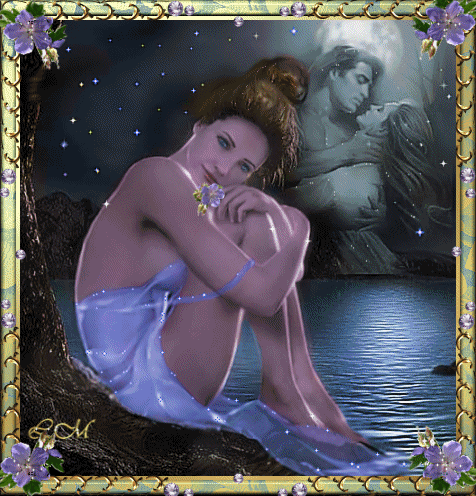
XCVII.
How like a winter hath my absence been
From thee, the pleasure of the fleeting year!
What freezings have I felt, what dark days seen!
What old December's bareness every where!
And yet this time removed was summer's time,
The teeming autumn, big with rich increase,
Bearing the wanton burden of the prime,
Like widow'd wombs after their lords' decease:
Yet this abundant issue seem'd to me
But hope of orphans and unfather'd fruit;
For summer and his pleasures wait on thee,
And, thou away, the very birds are mute;
Or, if they sing, 'tis with so dull a cheer
That leaves look pale, dreading the winter's near.

XCIX.
The forward violet thus did I chide:
Sweet thief, whence didst thou steal thy sweet that smells,
If not from my love's breath? The purple pride
Which on thy soft cheek for complexion dwells
In my love's veins thou hast too grossly dyed.
The lily I condemned for thy hand,
And buds of marjoram had stol'n thy hair:
The roses fearfully on thorns did stand,
One blushing shame, another white despair;
A third, nor red nor white, had stol'n of both
And to his robbery had annex'd thy breath;
But, for his theft, in pride of all his growth
A vengeful canker eat him up to death.
More flowers I noted, yet I none could see
But sweet or colour it had stol'n from thee.

CXI.
O, for my sake do you with Fortune chide,
The guilty goddess of my harmful deeds,
That did not better for my life provide
Than public means which public manners breeds.
Thence comes it that my name receives a brand,
And almost thence my nature is subdued
To what it works in, like the dyer's hand:
Pity me then and wish I were renew'd;
Whilst, like a willing patient, I will drink
Potions of eisel 'gainst my strong infection
No bitterness that I will bitter think,
Nor double penance, to correct correction.
Pity me then, dear friend, and I assure ye
Even that your pity is enough to cure me.

CXV.
Those lines that I before have writ do lie,
Even those that said I could not love you dearer:
Yet then my judgment knew no reason why
My most full flame should afterwards burn clearer.
But reckoning time, whose million'd accidents
Creep in 'twixt vows and change decrees of kings,
Tan sacred beauty, blunt the sharp'st intents,
Divert strong minds to the course of altering things;
Alas, why, fearing of time's tyranny,
Might I not then say 'Now I love you best,'
When I was certain o'er incertainty,
Crowning the present, doubting of the rest?
Love is a babe; then might I not say so,
To give full growth to that which still doth grow?

CXVII.
Accuse me thus: that I have scanted all
Wherein I should your great deserts repay,
Forgot upon your dearest love to call,
Whereto all bonds do tie me day by day;
That I have frequent been with unknown minds
And given to time your own dear-purchased right
That I have hoisted sail to all the winds
Which should transport me farthest from your sight.
Book both my wilfulness and errors down
And on just proof surmise accumulate;
Bring me within the level of your frown,
But shoot not at me in your waken'd hate;
Since my appeal says I did strive to prove
The constancy and virtue of your love.

CXLIX.
Canst thou, O cruel! say I love thee not,
When I against myself with thee partake?
Do I not think on thee, when I forgot
Am of myself, all tyrant, for thy sake?
Who hateth thee that I do call my friend?
On whom frown'st thou that I do fawn upon?
Nay, if thou lour'st on me, do I not spend
Revenge upon myself with present moan?
What merit do I in myself respect,
That is so proud thy service to despise,
When all my best doth worship thy defect,
Commanded by the motion of thine eyes?
But, love, hate on, for now I know thy mind;
Those that can see thou lovest, and I am blind.

No comments:
Post a Comment